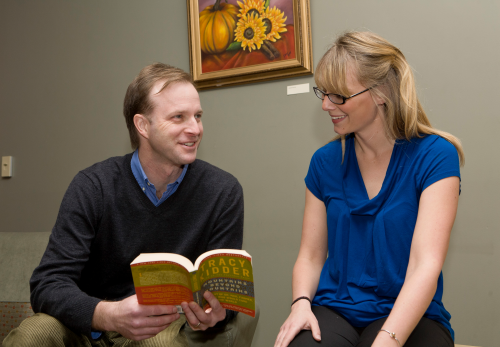|
|
“Louise” was coming to the end of her life. The widowed matriarch of a large family left no question that remaining at home was very important to her, even as her health declined with advancing age. Clara Keegan, MD, a former UMMS Worcester Family Medicine resident, wrote about her experience as Louise’s primary care physician in a reflective essay entitled “The Rewards of End of Life Care:”
“. . . the hospice nurse called [to tell] me that Louise was anxious and scared, and had called all of her family to join her at her home. I had not seen her in the office for a couple months. I finished my office work, called my husband to let him know I'd be home a little later than usual, and chose a route home that went by Louise's house.
. . . Her daughter was shocked when I arrived. She greeted me with a hug and brought me right in . . . [Louise] took a moment to recognize me, then grasped my hand tightly and expressed her fear. I gave what reassurance I could—listened to her heart, checked her pulse, and told her that she did not need to be afraid—that she was where she wanted to be, surrounded by all the people she loved the most.
. . . Louise died two days later. I was not able to attend the wake but sent a condolence card, thanking her daughter and the rest of the family for listening to Louise's deepest wishes and for helping her to have a peaceful death at home. The week after New Year's, an unexpected tower of boxes of treats arrived at our office. I will treasure the attached card always because of the note within: ‘Dear Dr. Keegan, We want to thank you for your lovely card—it meant so much to us. Also for all the caring, compassion, and respect you gave our mother. I don't think you realize the calm that came over us when you came to see Mom. . . . We will always be grateful and have a special place for you in our hearts.’
. . . I am glad I am a family doctor and can be helpful and therapeutic throughout the life cycle. ‘Doctoring’ does not always mean intervening, and the times when I do ‘nothing’ are often the most meaningful.”
Dr. Keegan’s story is one of dozens collected in the Department of Family Medicine & Community Health’s Thursday Morning Memos, a series of reflective essays written by department students, residents and faculty that embraces the concept of narrative medicine.
“The telling of our stories is how we in the medical community make peace with bad outcomes, honor patient relationships and process the meaning in our work,” said Associate Professor of Family Medicine & Community Health Hugh Silk, MD, who originated Thursday Morning Memos in his role as director of education at the UMMS Hahnemann Family Health Center residency program, and compiles and edits all submissions.
Narrative medicine is a practice in which clinicians write reflectively about their encounters with patients. Originally pioneered by Columbia University Professor of Clinical Medicine Rita Charon, MD, who visited UMMS in 2009 for a discussion and signing of her book Narrative Medicine: Honoring the Stories of Illness, narrative medicine upends the traditional notion that maintaining emotional distance from patients is what protects caregivers from becoming traumatized by their difficult work. Rather, through introspective writing, health care professionals can better imagine not only what their patients might be experiencing, but also understand, as Dr. Charon writes, “what they themselves endure in the care of the sick.”
Stories written for Thursday Morning Memos are e-mailed weekly to everyone in the department, plus a growing number of others in the UMMS community who have joined the Thursday Morning Memos e-mail ListServ. “Over 18 months in which 64 narratives were written by 49 people, readers and writers alike praised the stories as being ‘inspiring,’ ‘rejuvenating’ and ‘rewarding,’” Dr. Silk and colleagues wrote in a draft journal article about the program.
“We spun the title off of the department’s Monday Morning Memo from the chair, which recognizes academic achievements,” explained Silk. “Our focus is to celebrate clinical as well as academic successes.”
As interest in Thursday Morning Memos has grown, the original ListServ e-mail list has expanded to more than 450 readers, including medical and nursing students, and residents and faculty from other departments. Silk is grateful for logistical support for the expanding initiative provided by the Massachusetts Area Health Education Centers Network, a component of Commonwealth Medicine focused on community-based health care training, which maintains the ListServ and distributes each week’s edition. Further hoping to expand the reach of Thursday Morning Memos, Silk is seeking grant funding to bring the program to other medical schools in collaboration with the Family Medicine Educational Consortium.
“When I have written, I have found that it allows me to take stock of what happened—sometimes including a pause to pat oneself on the back,” said Silk, who considers himself a beneficiary as well as a teacher of narrative medicine. “It has been rewarding to see how this practice is helpful to individuals at all stages of their health care training and careers.”
